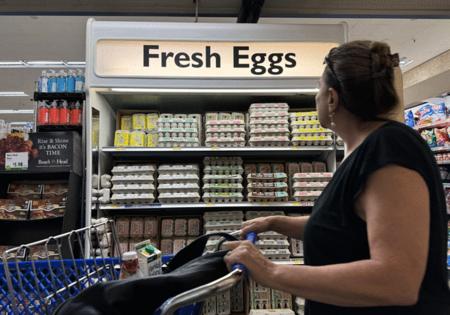US consumers long-run inflation views rise to highest since 1995
Published in News & Features
U.S. consumers’ long-term inflation expectations rose to the highest level in almost three decades on concerns President Donald Trump’s tariffs will translate into higher prices.
Consumers expect prices will climb at an annual rate of 3.5% over the next five to 10 years, according to the final February reading from the University of Michigan. The rate is the highest since 1995, based on data compiled by Bloomberg, and was almost entirely driven by views among survey respondents who are Democrats.
Partly as a result, the consumer sentiment index dropped to 64.7 from 71.7 in January — lower than analysts anticipated. Here, too, the results were politically polarized, with Democrats and political independent respondents driving the decline.
All five components of the index deteriorated, including a drop in buying conditions for big-ticket items. And more than half of consumers in the survey expect the unemployment rate to rise over the next year, the highest since 2020.
Inflation expectations have taken renewed importance as the prospect of trade wars is weighing on the outlook for prices paid by American consumers. The concerns dragged down the sentiment index, partly undoing a surge in the wake of Trump’s election in November that was driven by enthusiasm among Republicans and overall expectations that inflation would ease.
The uncertainty around tariffs and the potential impact on consumer prices may have implications for interest rates. Federal Reserve officials including Chair Jerome Powell have signaled they’re in no rush to cut rates further after progress on inflation stalled. Over the next 12 months, inflation expectations rose to 4.3% in the Michigan survey, the highest rate since November 2023.
“The Fed’s main focus is getting inflation back to target, especially given the potential for tariffs to ramp up price pressures,” said Priscilla Thiagamoorthy, senior economist at BMO Capital Markets. “The last thing it wants at this juncture of the economy is inflation expectations becoming unhinged.”
A sustained increase in long-term inflation views would be of particular concern to policymakers. Back in mid-2022, Fed officials paid close attention to the Michigan survey. Although circumstances where different at the time, a jump in inflation expectations in June 2022, combined with higher-than-expected consumer prices, prompted central bankers to raise interest rates by 75 basis points instead of 50.
“The concern with higher inflation expectations is that it can be self-fulfilling — what people and businesses expect to happen, often does,” said Elizabeth Renter, senior economist at NerdWallet. “While the Fed has said they don’t plan to respond directly to hypothetical risks of policy details yet-unknown, they are in tune to how consumers are weighing and potentially acting on those risks.”
Several Fed officials have recently said they may not need to respond to short-term price increases caused by tariffs if inflation expectations remain stable. But any indication that consumers expect price gains to continue may require officials to raise interest rates to tamp out inflation.
“It could be appropriate to ignore, or ‘look through,’ an increase in the price level if the impact on inflation is expected to be brief and limited,” St. Louis Fed President Alberto Musalem said Thursday. “However, a different monetary policy response could be appropriate if higher inflation is sustained, or longer-term inflation expectations rise.”
Long-run inflation expectations “exhibit substantial uncertainty, particularly in light of policy changes under the new presidential administration,” according to a separate report from the University of Michigan on inflation.
Economists, too, are anticipating higher inflation. A Bloomberg survey of analysts found an uptick in forecasts for the Fed’s preferred inflation measure in the first quarter compared with a month ago.
Separate data out Friday showed a slowdown in business activity in February, dragged down by the service sector. And existing-home sales dropped for the first time since September last month, as the combination of high mortgage rates and prices sets a grim backdrop heading into the crucial spring selling season.
In the Michigan survey, the current conditions gauge dropped to 65.7 from 75.1. Consumers’ perception of their financial situation deteriorated.
(With assistance from Nazmul Ahasan, Molly Smith, Alex Tanzi, Jonnelle Marte and Catarina Saraiva.)
©2025 Bloomberg L.P. Visit bloomberg.com. Distributed by Tribune Content Agency, LLC.







Comments